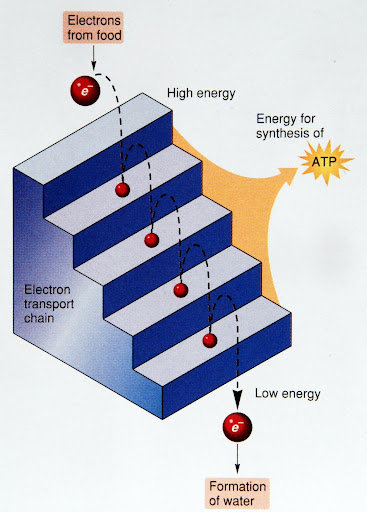- Cellular respiration is aerobic (requires oxygen)
- Cell takes in oxygen and releases carbon dioxide
- Glucose is common fuel for cellular respiration
- Glucose + 6 Oxygen ---> 6 Carbon Dioxide + 6 Water + ~38 ATP
- When an electron "falls" towards the nucleus potential energy is released
- Oxygen attracts electrons strongly
- Carbon and hydrogen have a much weaker pull
- A sugar molecule has several carbon-hydrogen bonds
- During cellular respiration the bonds are replaced with hydrogen-oxygen and carbon-oxygen bonds
- As electrons fall towards oxygen energy is released
 Cellular respiration breaks down glucose in several steps
Cellular respiration breaks down glucose in several steps- Electron carriers accept many high-energy electrons from the glucose
- Electron transport: Electron carriers passing the electrons to the next carrier
- At the end oxygen grabs the electron from the last carrier
- Binds with hydrogen ions to form water
- Between each trasnfer a little energy is released
Concept Check 7.4
1. Compare and contrast breathing and cellular respiration
Both breathing and cellular respiration take in oxygen and release carbon dioxide. Breathing supports cellular respiration because it provides the oxygen then expels the carbon dioxide created during cellular respiration.
2. List the reactants and products in cellular respiration.
The reactants for cellular respiration are glucose and 6 oxygen molecules. The products are 6 carbon dioxide molecules, 6 water molecules, and about 38 ATP molecules.
3. What is meant by the "falling" of electrons to oxygen? How does this process release energy?
The "falling" of electrons to oxygen is the strong pull oxygen has on electron molecules. As the electron falls towards the oxygen energy is released.
4. How does an electron transport chain result in the gradual release of energy stored in glucose?
In the electron transport chain as each electron is transfered to another carrier, a small amount of energy is released.

No comments:
Post a Comment